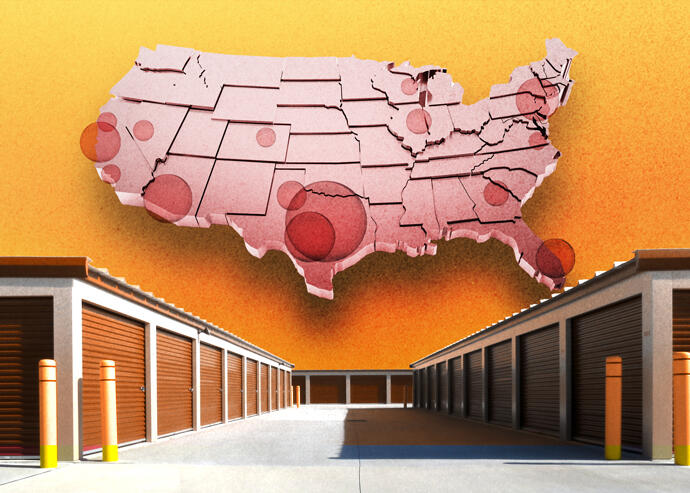
The self-storage sector added about 300 million square feet of new supply over the last decade, as the number of apartments grew and the size of each unit fell. (iStock)
People in the self-storage industry often talk about the “four Ds” that drive demand for their business: death, divorce, dislocation, and downsizing (or disaster, or density, depending on who you ask).
The past year has tragically delivered on a few of those, but has in the process made self-storage one of the more resilient sectors amid widespread economic uncertainty.
Taking a longer view, last year capped off another decade of growth in the self-storage sector, with 295 million square feet of space being added between 2011 and 2020, according to a recent report from RentCafé.
Even when apartment construction slowed down in the second half of the decade, “self-storage continued growing at a rapid pace as people prioritized location versus space in their apartment choices,” the report noted.
Across markets, the rental platform’s analysis found a substantial correspondence between new apartments and increased self-storage supply.
Dallas, which added 1.2 million residents in the past 10 years, saw 173,000 new apartments and 16.2 million more square feet of self-storage space over the same period — ranking it at the top nationwide by both measures.
New York City came in at No. 2 in both categories, adding 15.7 million square feet in self-storage space and 140,000 new apartments since 2011, according to the report. The report’s data came from parent company Yardi Matrix, and from the U.S. Census Bureau. Houston, Chicago, Phoenix, Atlanta and Miami also added at least 8 million square feet each in self storage space.

On a percentage basis, Milwaukee saw the most dramatic growth in self-storage space over the past decade, with 4 million square feet in new supply representing a 69 percent increase.
Austin, Texas — the nation’s fastest-growing major metro over the last 10 years — also saw an increase of more than 50 percent, as did Midwestern population hubs like Madison, Wisconsin, and Des Moines, Iowa. Markets like Phoenix and Atlanta have also seen growth, said Yardi Matrix’s Doug Ressler.
While self-storage supply has expanded across the country, so has demand, resulting in rent increases in many markets. Las Vegas saw the largest rent hike of all. Using the market’s benchmark “street rate” — the monthly rate for a 10-foot by 10-foot non-climate controlled storage unit — rents in Sin City jumped 27 percent between 2017 and 2021, from $88 to $112 a month, according to RentCafé’s analysis.
Self-storage rents in Honolulu have long been the highest in the country, with a current street rate of $260 a month. On the mainland, San Francisco, Los Angeles, New York and San Jose, California, have the highest self-storage rents of all, at more than $177 per month.
This year, RentCafé estimates the sector will see 765 new facilities delivered, totaling more than 56 million square feet of additional space.



